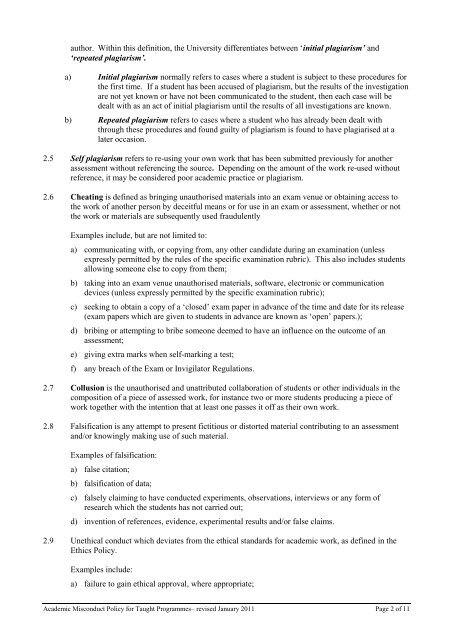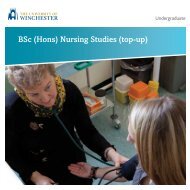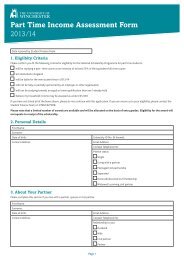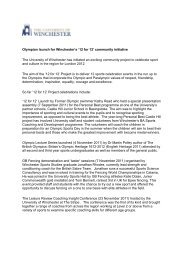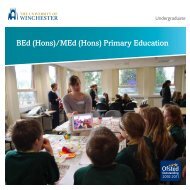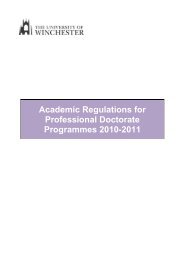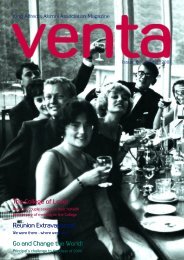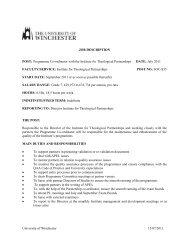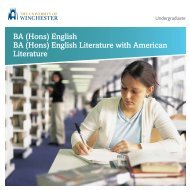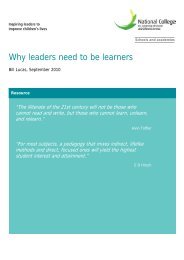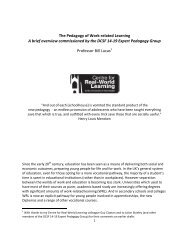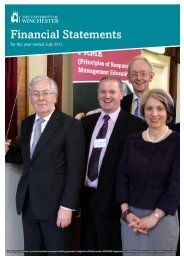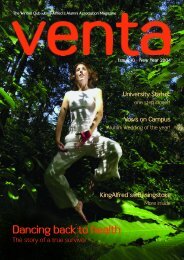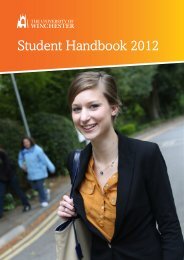College Regulations - University of Winchester
College Regulations - University of Winchester
College Regulations - University of Winchester
- No tags were found...
You also want an ePaper? Increase the reach of your titles
YUMPU automatically turns print PDFs into web optimized ePapers that Google loves.
author. Within this definition, the <strong>University</strong> differentiates between ‘initial plagiarism’ and‘repeated plagiarism’.a) Initial plagiarism normally refers to cases where a student is subject to these procedures forthe first time. If a student has been accused <strong>of</strong> plagiarism, but the results <strong>of</strong> the investigationare not yet known or have not been communicated to the student, then each case will bedealt with as an act <strong>of</strong> initial plagiarism until the results <strong>of</strong> all investigations are known.b) Repeated plagiarism refers to cases where a student who has already been dealt withthrough these procedures and found guilty <strong>of</strong> plagiarism is found to have plagiarised at alater occasion.2.5 Self plagiarism refers to re-using your own work that has been submitted previously for anotherassessment without referencing the source. Depending on the amount <strong>of</strong> the work re-used withoutreference, it may be considered poor academic practice or plagiarism.2.6 Cheating is defined as bringing unauthorised materials into an exam venue or obtaining access tothe work <strong>of</strong> another person by deceitful means or for use in an exam or assessment, whether or notthe work or materials are subsequently used fraudulentlyExamples include, but are not limited to:a) communicating with, or copying from, any other candidate during an examination (unlessexpressly permitted by the rules <strong>of</strong> the specific examination rubric). This also includes studentsallowing someone else to copy from them;b) taking into an exam venue unauthorised materials, s<strong>of</strong>tware, electronic or communicationdevices (unless expressly permitted by the specific examination rubric);c) seeking to obtain a copy <strong>of</strong> a ‘closed’ exam paper in advance <strong>of</strong> the time and date for its release(exam papers which are given to students in advance are known as ‘open’ papers.);d) bribing or attempting to bribe someone deemed to have an influence on the outcome <strong>of</strong> anassessment;e) giving extra marks when self-marking a test;f) any breach <strong>of</strong> the Exam or Invigilator <strong>Regulations</strong>.2.7 Collusion is the unauthorised and unattributed collaboration <strong>of</strong> students or other individuals in thecomposition <strong>of</strong> a piece <strong>of</strong> assessed work, for instance two or more students producing a piece <strong>of</strong>work together with the intention that at least one passes it <strong>of</strong>f as their own work.2.8 Falsification is any attempt to present fictitious or distorted material contributing to an assessmentand/or knowingly making use <strong>of</strong> such material.Examples <strong>of</strong> falsification:a) false citation;b) falsification <strong>of</strong> data;c) falsely claiming to have conducted experiments, observations, interviews or any form <strong>of</strong>research which the students has not carried out;d) invention <strong>of</strong> references, evidence, experimental results and/or false claims.2.9 Unethical conduct which deviates from the ethical standards for academic work, as defined in theEthics Policy.Examples include:a) failure to gain ethical approval, where appropriate;Academic Misconduct Policy for Taught Programmes– revised January 2011 Page 2 <strong>of</strong> 11


